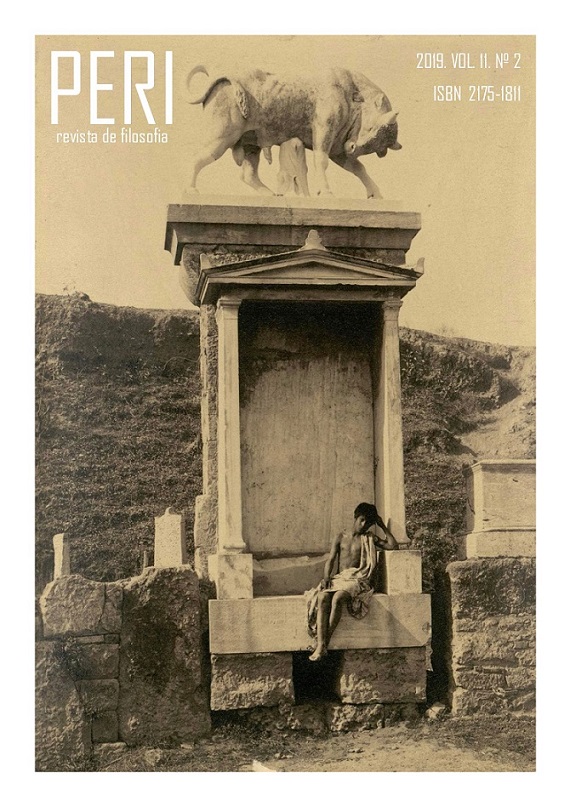O diagnóstico e a defesa do pluralismo em Rawls e Taylor
Palavras-chave:
liberalismo, comunitarismo, Rawls, Taylor, pluralismo.Resumo
O debate fomentado nos anos oitenta entre liberais e “comunitaristas” tende a contrastar radicalmente as concepções teóricas de John Rawls e Charles Taylor, sendo o primeiro o representante principal da vertente liberal e o segundo do “comunitarismo”. Ao contrário do que sustenta essa distinção, neste artigo proponho ir para além dela, a fim de defender que há convergências dos autores no que tange à discussão sobre o pluralismo. Em um primeiro momento, apresento os diagnósticos de Rawls e de Taylor quanto ao fato do pluralismo nas sociedades modernas como uma característica contextual irreversível (I). Em um segundo momento, diante da tensão ética insuperável entre divergentes concepções bem, a saída mais viável caminha para a justiça. Para tanto, desenvolvo a concepção de “justiça política” de Rawls em “O Liberalismo Político” e as publicações mais recentes de Charles Taylor como em “Secularism and Freedom of Conscience”, “A Secular Age” e “Why We Need a Radical Redefinition of Secularism?”, que parecem sustentar certa “virada liberal-rawlsiana” no pensamento do autor (II). Em um terceiro momento, efetuo uma distinção entre o fato do pluralismo (razoável) e o valor do pluralismo, para finalmente concluir o artigo argumentando que tanto Rawls como Taylor tendem a defender o pluralismo como um valor político para as instituições e não como um valor moral abrangente para os indivíduos.
Referências
ABBEY, R. Freedom – A silent but significant thread across Taylor’s oeuvre. Philosophy and Social Criticism, N.7, Vol. 44, 2018, p. 790 – 792.
ABBEY, R. Charles Taylor. Contemporary Philosophy in Focus. Cambridge: University Press, 2004.
BANKOVSKY, M. Social justice: defending Rawls theory of justice against Honneth’s objections. In: Philosophy & Social Criticism, N. 1, V. 37, 2011, p. 95 – 118.
COHEN, J. Pluralism and Proceduralism. Chicago-Kent Law Review, N.69, 1994, p. 589 – 618.
COHEN, J. Democratic equality. Ethics, N. 4, V. 99, 1989, p. 727 – 51.
HART, H. L. A. Rawls on liberty and its priority. IN: DANIELS, N. (ed.) Reading Rawls. Oxford: Basil Blackwell, 1975, p. 230 – 252.
EYAL, N. ‘Perhaps the most important primary good’: self-respect and Rawls’s principles of justice”. Politics, Philosophy & Economics, N. 2, V. 4, 2005, p. 195 – 219.
FERRARA, Alessandro. The art of holding opposites together. Philosophy and Social Criticism, Vol. N. 7, V. 44, 2018a, p. 745 – 747.
FERRARA, Alessandro. Can political liberalism help us rescue “the people” from populism? Philosophy and Social Criticism, N. 4-5, V. 38, 2018b, p.435 – 444.
FERRARA, Alessandro. Hyper-pluralism and the multivariate democratic polity. Philosophy and Social Criticism, N. 15, V. 1, 2012, p.1 – 15.
FERRARA, Alessandro. Reflexive pluralism. Philosophy & Social Criticism, N 3–4, V.36, 2010, p. 353 – 364.
FERRARA, Alessandro. Public reason and the normativity of the reasonable. Philosophy & Social Criticism, N. 5–6, V. 30, 2004, p. 579 – 596.
FORST, R. Contextos de Justiça. Tradução de Denilson Werle. SP: Boitempo, 2010.
FRASER, Nancy. For Charles Taylor: An appreciation. Philosophy and Social Criticism, N. 7, V. 44, 2018, p. 759 – 760.
FRASER, Nancy. Scales of Justice. Cambridge: University Press, 2010.
GUTTMAN, A. The power of recognition: When Charles Taylor parsed personal identity. Philosophy and Social Criticism, N.7, V. 44, 2018, p. 793 – 795.
GUTTMAN, A; THOMPSON, Dennis. Moral Conflict and Political Consensus. Ethics, N. 1, V. 101, 1990, p. 64 – 88.
GUTTMAN, A. Communitarian Critics of Liberalism. Review. Philosophy & Public Affairs, N.3, V. 14, 1985, p. 308 – 322.
HABERMAS, J. A letter to an old friend and colleague on his birthday. Philosophy and Social Criticism, N.7, V. 44, 2018, p. 800 – 801.
HONNETH, Axel. Taylor’s Hegel. Philosophy and Social Criticism, N.7, V. 44, 2018, p. 773 – 774.
MANDLE, J.; REIDY, D. The Cambridge Rawls Lexicon. Cambridge: University Press, 2015.
MILLER, D. Democracy and social justice. British Journal of Political Science, N.1, V.8, 1978, p. 1 – 19.
RAWLS, J. Political Liberalism. New York: Columbia University Press, 1993.
RAWLS, J. Lectures on Moral the History of Moral Philosophy. Ed. by Barbara Herman. Cambridge: Harvard Press, 2000.
RAWLS, J. Justice as Fairness: A Restatement. Ed. by Erin Kelly. Cambridge: Harvard Press, 2001.
RAWLS, J. A Theory of Justice. Cambridge/Mass.: The Belknap Press of Harvard University Press, 2003.
RAWLS, J. Lectures on the History of Political Philosophy. Ed. by Samuel Freeman. Cambridge: Harvard Press, 2007.
RAZ, Joseph. The Morality of Freedom. Oxford: Clarendon Press, 1988.
SHUE, H. Liberty and self-respect. Ethics, N.3, V. 85, 1975, p. 195 – 203.
TAYLOR, C; MACLURE, J. Secularism and Freedom of Conscience. London: Harvard Press, 2011a.
TAYLOR, C. Why We Need a Radical Redefinition of Secularism? IN: MENDIETA, E.; VANANTWERPEN, J. The Power of Religion in the Public Sphere. NY: Columbia Press, 2011.
TAYLOR, C. A Secular Age. London: Harvard Press, 2007.
TAYLOR, C. As Fontes do Self. A construção da identidade moderna. Tradução de Adail U. Sobral e Dinah Azevedo. SP: Loyola, 2005.
TAYLOR, C. The Ethics of Authenticity. London: Harvard Press, 1991.
Downloads
Publicado
Edição
Seção
Licença
1. Autores mantém os direitos autorais e concedem à revista o direito de primeira publicação, com o trabalho simultaneamente licenciado sob a Creative Commons Attribution License que permite o compartilhamento do trabalho com reconhecimento da autoria do trabalho e publicação inicial nesta revista.
2. Autores têm autorização para assumir contratos adicionais separadamente, para distribuição não-exclusiva da versão do trabalho publicada nesta revista (ex.: publicar em repositório institucional ou como capítulo de livro), com reconhecimento de autoria e publicação inicial nesta revista.
3. Autores têm permissão e são estimulados a publicar e distribuir seu trabalho online (ex.: em repositórios institucionais ou na sua página pessoal) a qualquer ponto antes ou durante o processo editorial, já que isso pode gerar alterações produtivas, bem como aumentar o impacto e a citação do trabalho publicado (Veja O Efeito do Acesso Livre).


